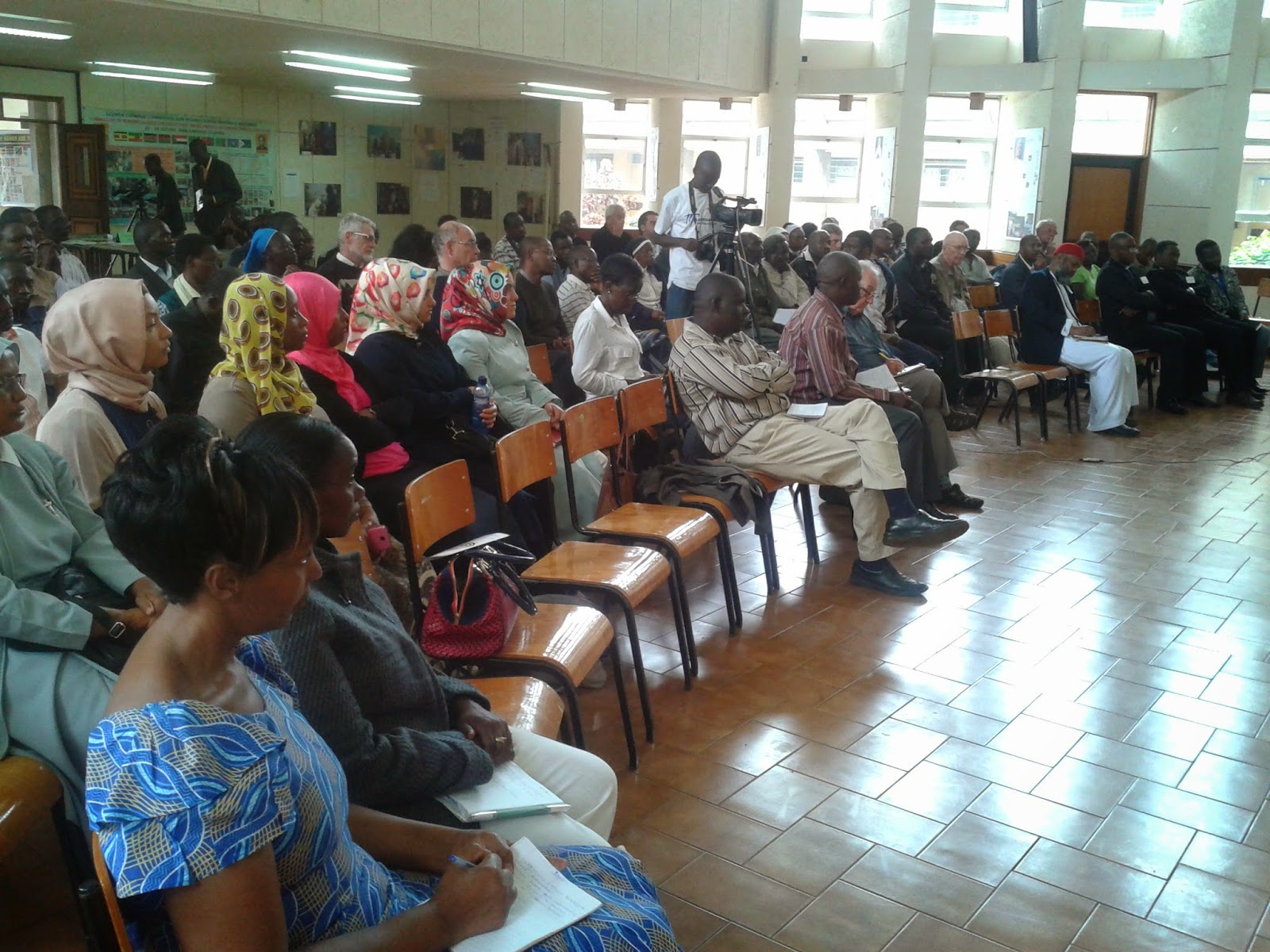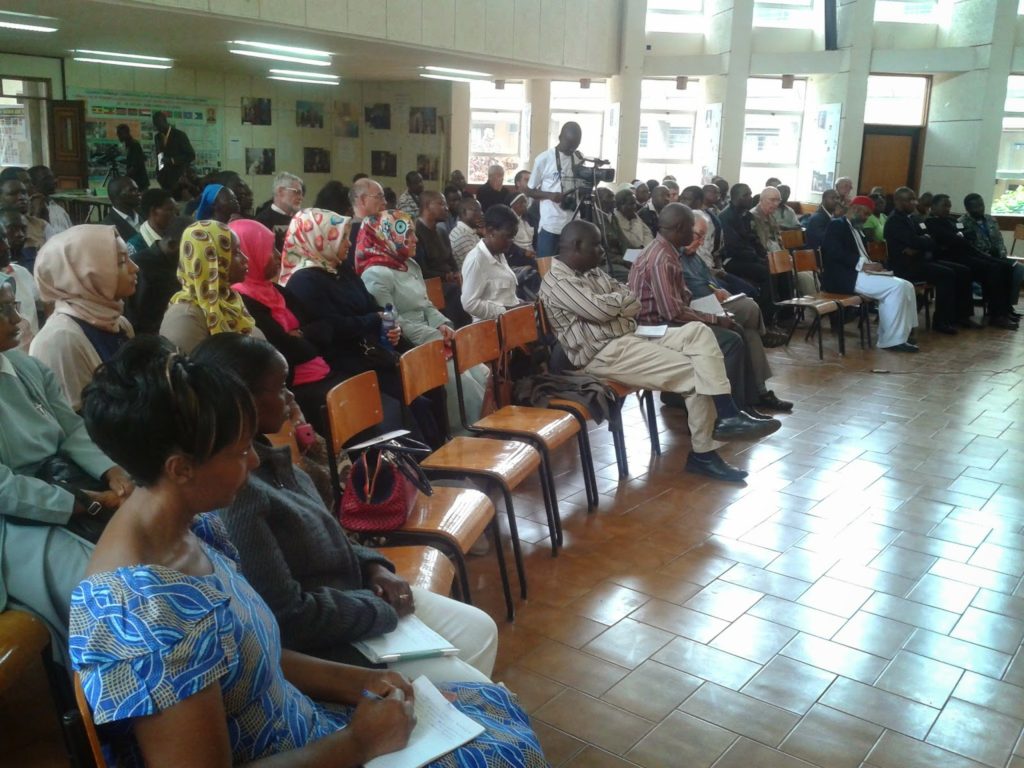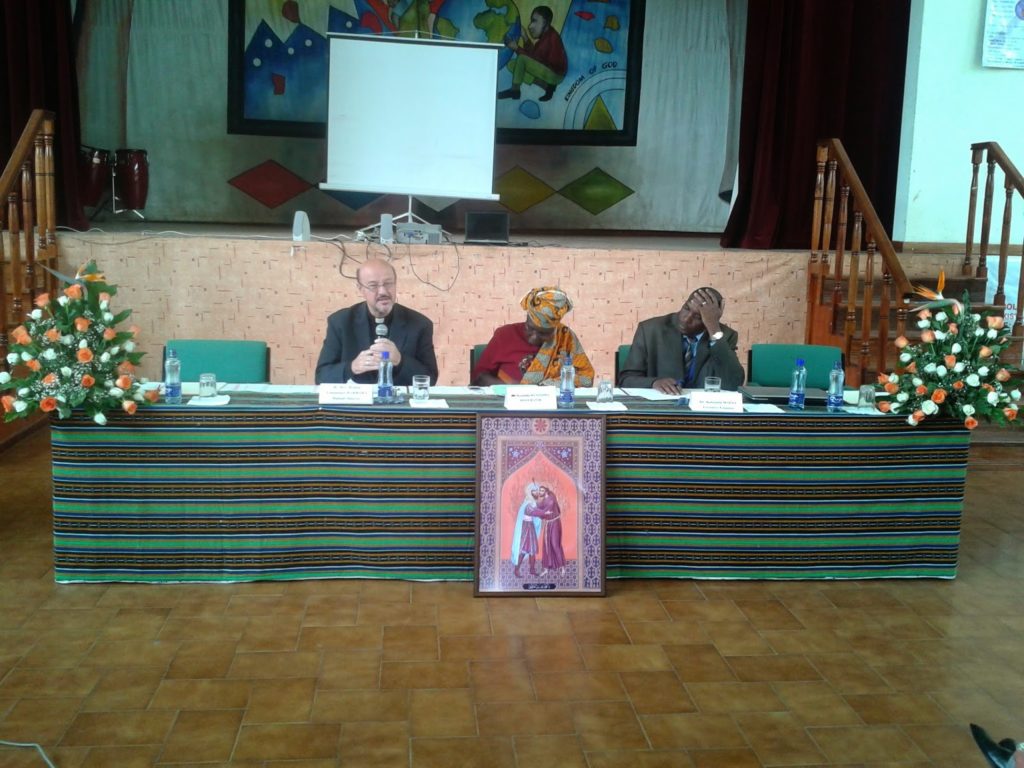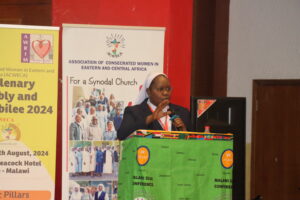AMECEA: AMECEA Pastoral Department Joins Church’s initiatives of Promoting Interreligious Dialogue

 |
| Part of the Symposium Participants at Tangaza College |
The
department of Islamic Studies at Tangaza University College, a constituent
College of the Catholic University of Eastern Africa in collaboration with the
AMECEA Pastoral Department, on 10th May 2014 held an Inter-Religious
Dialogue Symposium which focused on Muslim-Christian
relations in East Africa: challenges and perspectives for the future.
department of Islamic Studies at Tangaza University College, a constituent
College of the Catholic University of Eastern Africa in collaboration with the
AMECEA Pastoral Department, on 10th May 2014 held an Inter-Religious
Dialogue Symposium which focused on Muslim-Christian
relations in East Africa: challenges and perspectives for the future.
The
Symposium which had 120 participants from Kenya, Tanzania and Uganda was spearheaded
by Fr. Felix Phiri (M.Afr.), Head of the Department. The 120 participants were
from both Christian and Muslim Communities.
Symposium which had 120 participants from Kenya, Tanzania and Uganda was spearheaded
by Fr. Felix Phiri (M.Afr.), Head of the Department. The 120 participants were
from both Christian and Muslim Communities.
The
aim of the Symposium was to bring together leaders of organizations that are
involved in the promotion of Christian – Muslim relationship for the purpose of
building a society that share the common goal of the human community, unity,
tolerance and co-existence. It also helped to create the awareness that the
Tangaza College administration is committed to promoting programmes of
Inter-Religious Dialogue and Islamic studies. The administration has been
working closely with the help of the Society of the Missionaries of Africa and
AMECEA Pastoral Department to ensure that this program becomes beneficial to
all those who are engaged in promoting Inter-Religious Dialogue.
aim of the Symposium was to bring together leaders of organizations that are
involved in the promotion of Christian – Muslim relationship for the purpose of
building a society that share the common goal of the human community, unity,
tolerance and co-existence. It also helped to create the awareness that the
Tangaza College administration is committed to promoting programmes of
Inter-Religious Dialogue and Islamic studies. The administration has been
working closely with the help of the Society of the Missionaries of Africa and
AMECEA Pastoral Department to ensure that this program becomes beneficial to
all those who are engaged in promoting Inter-Religious Dialogue.
The
Symposium included paper presentations and testimonies shared by both Christian
and Muslim participants on the common destiny of humanity in the search for
God, the need to understand each other’s faith, culture and beliefs in order to
appreciate the differences with respect for the common good of our society. Among
the presenters was Bishop Emmanuel Barbara of Malindi Diocese who is also the
Apostolic Administrator of the Archdiocese of Mombasa. In his presentation,
Bishop Barabara shared his experiences of close collaboration with the Muslim
leaders in the coastal region of Kenya and pointed at some of the successes
despite the challenges and obstacles.
Symposium included paper presentations and testimonies shared by both Christian
and Muslim participants on the common destiny of humanity in the search for
God, the need to understand each other’s faith, culture and beliefs in order to
appreciate the differences with respect for the common good of our society. Among
the presenters was Bishop Emmanuel Barbara of Malindi Diocese who is also the
Apostolic Administrator of the Archdiocese of Mombasa. In his presentation,
Bishop Barabara shared his experiences of close collaboration with the Muslim
leaders in the coastal region of Kenya and pointed at some of the successes
despite the challenges and obstacles.
Other
presenters included Dr Kahumbi Maina, who lecturers at Kenyatta University and
Tangaza College. His presentation focused of the history of the Christian –
Muslim relationship in Eastern Africa. Others were Mr. Richard Yiga – a
pastoral agent for Inter-Religious Dialogue in Uganda, Fr. Benedict Shemfumbwa
– the Executive Secretary of the Commission for Interreligious Dialogue at the
Tanzania Episcopal Conference, Ms. Rahma Hersi – a Kenyan Muslim lawyer, Dr
Joseph Wandera and Rev. Willem Jansen – lecturers at St Paul’s University in
Limuru, Rev. Lesmore Ezechiel – Program Officer at PROCMURA, Sheikh Bunni Meraqbash
– a Sufi, and Mr Muhammad Abdirizak –
a Somali youth organizer and human rights activist.
presenters included Dr Kahumbi Maina, who lecturers at Kenyatta University and
Tangaza College. His presentation focused of the history of the Christian –
Muslim relationship in Eastern Africa. Others were Mr. Richard Yiga – a
pastoral agent for Inter-Religious Dialogue in Uganda, Fr. Benedict Shemfumbwa
– the Executive Secretary of the Commission for Interreligious Dialogue at the
Tanzania Episcopal Conference, Ms. Rahma Hersi – a Kenyan Muslim lawyer, Dr
Joseph Wandera and Rev. Willem Jansen – lecturers at St Paul’s University in
Limuru, Rev. Lesmore Ezechiel – Program Officer at PROCMURA, Sheikh Bunni Meraqbash
– a Sufi, and Mr Muhammad Abdirizak –
a Somali youth organizer and human rights activist.
Their
presentations gave a broad view of the situation concerning Muslim-Christians
in the region and testimonies of the concrete interreligious activities being jointly
undertaken by various Muslim and Christian organisations in favour of promoting
Inter-Religious Dialogue.
presentations gave a broad view of the situation concerning Muslim-Christians
in the region and testimonies of the concrete interreligious activities being jointly
undertaken by various Muslim and Christian organisations in favour of promoting
Inter-Religious Dialogue.
 |
| Bishop Emmanuel Barbara (Left) giving his presentation |
The
speakers touched on common values that unite people of different religious
backgrounds. The testimonies of the different organizations were yet another
proof that people of different religious affiliations can indeed make a big
difference in society and can contribute to holistic human development. Efforts
were equally made to sincerely express sound views about the issue of terrorism
as attributed to religious extremism, particularly in Kenya and to a lesser
extent in Tanzania. The speakers stated that terrorism and religious
radicalization cannot be attributed to religion alone but also to the moral
decadence and vulnerability of those who are persuaded to cause atrocities
because of the extreme poor social conditions.
speakers touched on common values that unite people of different religious
backgrounds. The testimonies of the different organizations were yet another
proof that people of different religious affiliations can indeed make a big
difference in society and can contribute to holistic human development. Efforts
were equally made to sincerely express sound views about the issue of terrorism
as attributed to religious extremism, particularly in Kenya and to a lesser
extent in Tanzania. The speakers stated that terrorism and religious
radicalization cannot be attributed to religion alone but also to the moral
decadence and vulnerability of those who are persuaded to cause atrocities
because of the extreme poor social conditions.
The
symposium was preceded by five days of an interfaith exhibition showing the
collection of the ‘World Religions-Universal Peace-Global Ethics’, which is composed
of twelve panels. This was made available by the Ecumenical Centre for Justice
and Peace in Nairobi with the help of Mr Ingo Stang. Other exhibitions included
banners, posters, calendars and other interfaith literature from: the Iranian
Cultural Council in Nairobi, the Commission for Interreligious Dialogue of the
Tanzania Episcopal Conference, the Missionaries of Africa and PROCMURA. During
the five days of the exhibition, seven one-hour documentaries on Traditional
Religions, Chinese Religions, Hinduism, Buddhism, Judaism, Christianity and
Islam were projected.
symposium was preceded by five days of an interfaith exhibition showing the
collection of the ‘World Religions-Universal Peace-Global Ethics’, which is composed
of twelve panels. This was made available by the Ecumenical Centre for Justice
and Peace in Nairobi with the help of Mr Ingo Stang. Other exhibitions included
banners, posters, calendars and other interfaith literature from: the Iranian
Cultural Council in Nairobi, the Commission for Interreligious Dialogue of the
Tanzania Episcopal Conference, the Missionaries of Africa and PROCMURA. During
the five days of the exhibition, seven one-hour documentaries on Traditional
Religions, Chinese Religions, Hinduism, Buddhism, Judaism, Christianity and
Islam were projected.
Speaking
to AMECEA online news, Fr. Phiri (M.Afr.) expressed optimism that this first
initiative by the Department of Islamic Studies is aimed at creating a forum
for sharing of faith experiences, discussing common issues affecting our
society and proposing the way forward that is guided by the diversity of our
faith. Fr. Phiri is former lecturer of the Pontifical Institute for Islamic and
Arabic Studies (PISAI) and since September 2013 he is heading the Department of
Islamic studies and promoting Inter-Religious Dialogue in Eastern Africa.
to AMECEA online news, Fr. Phiri (M.Afr.) expressed optimism that this first
initiative by the Department of Islamic Studies is aimed at creating a forum
for sharing of faith experiences, discussing common issues affecting our
society and proposing the way forward that is guided by the diversity of our
faith. Fr. Phiri is former lecturer of the Pontifical Institute for Islamic and
Arabic Studies (PISAI) and since September 2013 he is heading the Department of
Islamic studies and promoting Inter-Religious Dialogue in Eastern Africa.
Fr.
Febian Pikiti Mulenga, the AMECEA Pastoral Department, expressed the commitment
of the AMECEA Bishops to promoting Inter-Religious Dialogue. He said that his
department, in collaboration with the Fr. Phiri, are working at creating the
AMECEA Network for Inter-Religious Dialogue (AMECEA-NID). The aim of this forum
or network is to bring together, propose training and pastoral initiatives
coordinated by National Directors/Executive Secretaries for Commissions
Inter-Religious Dialogue in the AMECEA countries.
Febian Pikiti Mulenga, the AMECEA Pastoral Department, expressed the commitment
of the AMECEA Bishops to promoting Inter-Religious Dialogue. He said that his
department, in collaboration with the Fr. Phiri, are working at creating the
AMECEA Network for Inter-Religious Dialogue (AMECEA-NID). The aim of this forum
or network is to bring together, propose training and pastoral initiatives
coordinated by National Directors/Executive Secretaries for Commissions
Inter-Religious Dialogue in the AMECEA countries.
This
will create a structure for collaboration; inter-connection and a platform
promote a concerted effort of the Catholic Church to strategically engage on
dialogue with followers of other religions. Once approved by the AMECEA
Bishops, this network has the potential to provide capacity building of those
engaged in dialogue with Non-Christian religions and providing resource
materials useful for this apostolate.
will create a structure for collaboration; inter-connection and a platform
promote a concerted effort of the Catholic Church to strategically engage on
dialogue with followers of other religions. Once approved by the AMECEA
Bishops, this network has the potential to provide capacity building of those
engaged in dialogue with Non-Christian religions and providing resource
materials useful for this apostolate.
Meanwhile,
AMECEA Pastoral Department will be facilitating a workshop sponsored by Fr. Joseph
Healey, MM on Small Christian Communities in Mwanza for the Metropolitan
Dioceses of Mwanza which includes: The Archdiocese of Mwanza, The Dioceses of
Bukoba, Musoma, Shinyanga, Geita, Rulenge Ngara, Kayanga and Bunda. The
workshop will take place from 19th – 23rd May and will be centred on
The
Word
of God in Small Christian Communities. The workshop is the fourth in a series of
National Small Christian Communities’ Workshops in the nine AMECEA countries.
The previous workshops have been held in Ethiopia, Zambia and Malawi.
AMECEA Pastoral Department will be facilitating a workshop sponsored by Fr. Joseph
Healey, MM on Small Christian Communities in Mwanza for the Metropolitan
Dioceses of Mwanza which includes: The Archdiocese of Mwanza, The Dioceses of
Bukoba, Musoma, Shinyanga, Geita, Rulenge Ngara, Kayanga and Bunda. The
workshop will take place from 19th – 23rd May and will be centred on
The
Word
of God in Small Christian Communities. The workshop is the fourth in a series of
National Small Christian Communities’ Workshops in the nine AMECEA countries.
The previous workshops have been held in Ethiopia, Zambia and Malawi.
Source:
AMECEA Pastoral Department
AMECEA Pastoral Department


